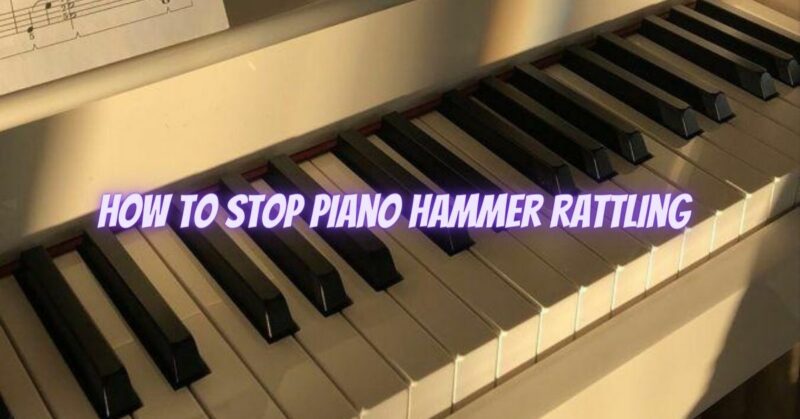Piano hammer rattling can be a frustrating issue that affects the overall sound and performance of the instrument. When you hear unwanted buzzing or rattling sounds while playing certain notes, it’s time to address the problem and restore the piano’s optimal sound quality. Here are some effective solutions to help you stop piano hammer rattling:
- Tighten Flanges and Capstans: One of the primary causes of hammer rattling is loose flanges or capstans. These components secure the hammers in place and regulate their movement. Carefully inspect all the flanges and capstans, and tighten any loose screws or connections. Be cautious while performing this task, and if you’re unsure, seek assistance from a professional piano technician.
- Align the Hammers: Proper alignment of the hammers is crucial for eliminating rattling. Each hammer should strike the strings perpendicularly and without interference. Misaligned hammers can cause unwanted vibrations and rattling sounds. Adjust the hammer alignment as needed to ensure they strike the strings correctly.
- Voicing the Hammer Felt: Over time, the hammer felt can wear down, leading to uneven surfaces. This wear can cause rattling or buzzing when the hammers come into contact with the strings. Voicing the hammer felt involves shaping and needling the felt to achieve a consistent and even tone. Professional piano technicians can perform this task to ensure the best results.
- Check Dampers: Malfunctioning or poorly regulated dampers can contribute to rattling sounds. The dampers should lift and drop quickly and precisely to stop the strings from vibrating when the keys are released. Have a technician inspect and regulate the dampers to ensure they function correctly.
- Inspect Strings and Agraffes: Loose strings or agraffes can cause rattling. Carefully inspect the strings and agraffes to ensure they are securely in place and not interfering with the hammers’ movement.
- Address Excessive Resonance: Excessive resonance within the piano can also cause rattling. Resonance can occur when the soundboard or other components vibrate excessively, creating unwanted noise. Piano voicing and adjustments can help address this issue and reduce rattling.
- Seek Professional Assistance: If you’ve tried the above steps and the rattling persists, it’s best to consult a professional piano technician. They have the expertise and knowledge to diagnose and fix complex issues related to the piano’s action and sound.
Conclusion: Stopping piano hammer rattling requires careful inspection, adjustments, and, in some cases, professional assistance. Regular maintenance and tuning are essential to prevent and address rattling problems. Remember that pianos are intricate instruments, and unless you are experienced in piano repair, it’s best to leave complex issues to the experts. By addressing hammer rattling promptly and with proper care, you can ensure your piano produces beautiful, resonant tones and remains a joy to play for years to come.


